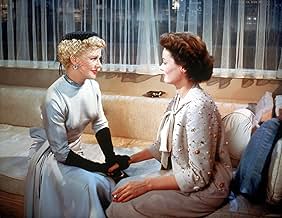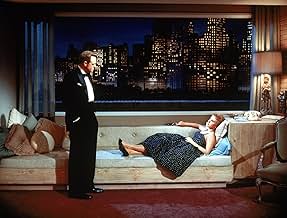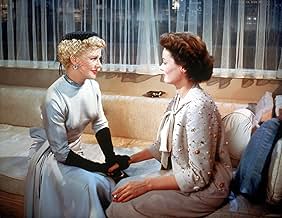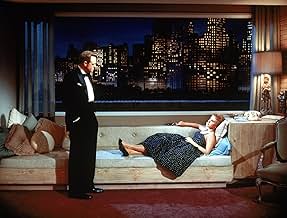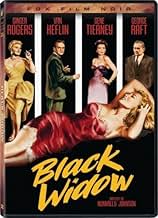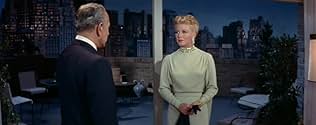CALIFICACIÓN DE IMDb
6.7/10
3.4 k
TU CALIFICACIÓN
Una joven escritora comienza a entrar en la vida de un productor de Broadway.Una joven escritora comienza a entrar en la vida de un productor de Broadway.Una joven escritora comienza a entrar en la vida de un productor de Broadway.
- Dirección
- Guionistas
- Elenco
Mabel Albertson
- Sylvia
- (sin créditos)
Edward Astran
- Party Guest
- (sin créditos)
Bea Benaderet
- Mrs. Franklin Walsh
- (sin créditos)
Mary Benoit
- Party Guest
- (sin créditos)
Nesdon Booth
- Police A.P.B. Man
- (sin créditos)
Paul Bradley
- Party Guest
- (sin créditos)
Steve Carruthers
- Party Guest
- (sin créditos)
- Dirección
- Guionistas
- Todo el elenco y el equipo
- Producción, taquilla y más en IMDbPro
Opiniones destacadas
Van Heflin gives a striking, forceful performance as a theatrical producer in New York City who befriends a lonely 20-year-old girl at a party; she's a would-be writer hoping for success, he takes a shine to her and offers a helping hand...but then she turns up dead! Curiously mistitled drama really doesn't involve "a predatory female". Peggy Ann Garner is intriguing as the youngster who, in flashbacks, is revealed to be scheming and ambitious, somewhat ruthless, but not a black widow. Gene Tierney has a thankless role as Heflin's wife (she looks grim throughout), but Ginger Rogers is fun as a colorful, gossiping actress. The film has some ridiculous passages, red herrings and side-plots (one involving another young woman who appears to be fabricating a wild story just to frame Heflin is never explored), and a slightly anti-climactic finish. The film looks good and has some funny/catty lines in the beginning, but in the end it all seems a bit silly. **1/2 from ****
"Black Widow" is a well-written, though old-style, entertaining mystery. The story is taken from a novel by Patrick Quentin, a sound mystery-writer.
However the essence of the movie lies in the magnificent cinemascope photography, colors and visual effects. Note that most scenes have in the background large windows or terraces wide-open on the spectacular, terrific New York sceneries. Even the furniture of the various apartments is carefully chosen and placed, with beautiful artistic effects. Outstanding is the brief scene inside the dark bar, with the costumers merged into a liquid light: an evident reminiscence of Edward Hopper's paintings.
Alas! All these visual beauties are seriously damaged, if not destroyed, by the TV version, which essentially shows just half of the screen.
The performances by all interpreters are generally good and professional. A major (personal) disappointment is that Gene Tierney does nothing. She's not even in the list of suspects, since she was thousands of miles away from New York during the whole murder affair. She just sits silently on the background, adding her incomparable beauty and natural refinement to the magnificent New York views. It should be added that George Raft seems completely out-of-role... but I'm too fond of this guy to be able to criticize him.
"Black Widow" is a good film; hopefully someone will be able to see it on the wide screen.
However the essence of the movie lies in the magnificent cinemascope photography, colors and visual effects. Note that most scenes have in the background large windows or terraces wide-open on the spectacular, terrific New York sceneries. Even the furniture of the various apartments is carefully chosen and placed, with beautiful artistic effects. Outstanding is the brief scene inside the dark bar, with the costumers merged into a liquid light: an evident reminiscence of Edward Hopper's paintings.
Alas! All these visual beauties are seriously damaged, if not destroyed, by the TV version, which essentially shows just half of the screen.
The performances by all interpreters are generally good and professional. A major (personal) disappointment is that Gene Tierney does nothing. She's not even in the list of suspects, since she was thousands of miles away from New York during the whole murder affair. She just sits silently on the background, adding her incomparable beauty and natural refinement to the magnificent New York views. It should be added that George Raft seems completely out-of-role... but I'm too fond of this guy to be able to criticize him.
"Black Widow" is a good film; hopefully someone will be able to see it on the wide screen.
I greatly enjoyed this Cinemascope, Stereo-Sound romp, but mainly as a Guilty Pleasure, as it's a film very much of it's time, with mismatched acting styles, lush, unbelievable sets, a central premise that doesn't make much sense (lending your expensive apartment to a just-met down-and-out writer while your wife's away),and an early attempt to make visual sense of the then-new wide-screen process.
Why do I like it? Ginger Rogers is way over the top, popping on and off screen with snappy diva one-liners, like Margo Channing on pep pills; Peggy Ann Garner plays a subversive Lolita, crazy-seductive and irresistible, and you can even spot Aaron Spelling towards the end in a bit part as a theatre employee.
The palette is loaded with pastel colors so popular in the 1950's, and the whole thing is sort of a mild domestic whodunit whipped up into an anemic Douglas Sirk confection. Great it ain't, but because of Rogers, Van Heflin, Gene Tierney (who has very little to do but does it beautifully) and Reginald Gardner, I found it greatly entertaining.
Why do I like it? Ginger Rogers is way over the top, popping on and off screen with snappy diva one-liners, like Margo Channing on pep pills; Peggy Ann Garner plays a subversive Lolita, crazy-seductive and irresistible, and you can even spot Aaron Spelling towards the end in a bit part as a theatre employee.
The palette is loaded with pastel colors so popular in the 1950's, and the whole thing is sort of a mild domestic whodunit whipped up into an anemic Douglas Sirk confection. Great it ain't, but because of Rogers, Van Heflin, Gene Tierney (who has very little to do but does it beautifully) and Reginald Gardner, I found it greatly entertaining.
When I watched this movie on DVD, the plot and characters seemed familiar. I realized that the story was based on an episode in the "Peter Duluth" series by Patrick Quentin. For some reason, they changed the character's name to Peter Denver - maybe they thought it was easier to pronounce.
"Patrick Quentin" was a pen name used by four different writers in various combinations from around 1930 into the 1960s. They also used the names Q. Patrick and Jonathan Stagge. See the Wikipedia article on Patrick Quentin for more details.
The best known Patrick Quentin novels are those featuring Peter Duluth, a Broadway producer, and his wife Iris, a famous actress. They solve mysteries in the glamorous New York theatre world - a bit like Nick and Nora Charles. Most of these novels have the word "puzzle" in the title - "Puzzle for Fools", "Puzzle for Players", etc. "Black Widow", published in 1952, was an exception to the title pattern. All of the Duluth novels I have read have been very entertaining "Golden Age" mysteries, and I highly recommend them to mystery fans. In fact, all of the books by Patrick Quentin or any of his pseudonyms that I have read have been very good mysteries.
I was surprised that this script was given such high-end treatment - Cinemascope Technicolor and stereo sound. The script is a bit old fashioned, with its narration and flashbacks, and the cast is so-so. I think Peter Duluth was intended to be a more dashing character than the rather frumpy Van Heflin could convey. Cary Grant would have been perfect in the role. I still found it an entertaining 90 minutes. But check out the Peter Duluth books for a truly good read.
"Patrick Quentin" was a pen name used by four different writers in various combinations from around 1930 into the 1960s. They also used the names Q. Patrick and Jonathan Stagge. See the Wikipedia article on Patrick Quentin for more details.
The best known Patrick Quentin novels are those featuring Peter Duluth, a Broadway producer, and his wife Iris, a famous actress. They solve mysteries in the glamorous New York theatre world - a bit like Nick and Nora Charles. Most of these novels have the word "puzzle" in the title - "Puzzle for Fools", "Puzzle for Players", etc. "Black Widow", published in 1952, was an exception to the title pattern. All of the Duluth novels I have read have been very entertaining "Golden Age" mysteries, and I highly recommend them to mystery fans. In fact, all of the books by Patrick Quentin or any of his pseudonyms that I have read have been very good mysteries.
I was surprised that this script was given such high-end treatment - Cinemascope Technicolor and stereo sound. The script is a bit old fashioned, with its narration and flashbacks, and the cast is so-so. I think Peter Duluth was intended to be a more dashing character than the rather frumpy Van Heflin could convey. Cary Grant would have been perfect in the role. I still found it an entertaining 90 minutes. But check out the Peter Duluth books for a truly good read.
No matter how pretentious the cocktail party, never escape by asking another wallflower out for dinner. That was theatrical producer Van Heflin's mistake when, on the terrace of Broadway diva Ginger Rogers' apartment, he took pity on hopeful young writer Peggy Ann Garner. Just a few months later, she was found hanged in the bathroom of his apartment.
It was all very innocent, though. While his wife, another star on the Rialto (Gene Tierney), was away tending to her ailing mother, Heflin let Garner use his place as a daytime office so she could write in quiet comfort. (Well, not so quiet: She listens to `The Dance of the Seven Veils' from Salome incessantly and fixates on a line from the opera: `The mystery of love is stronger than the mystery of death.') But when it turns out not only that she was pregnant but that she was murdered, the police sensibly enough find in Heflin their prime suspect.
Black Widow, written and directed by Nunnally Johnson, assembles an impressive array of Hollywood luminaries across whose resumés long shadows were beginning to creep. Along with Rogers, Tierney and Heflin, there's George Raft as a police detective, Otto Krueger as Garner's actor uncle and Reginald Gardiner as Rogers' whipped spouse. It's an ensemble-cast, 40s-high-style mystery movie, made about a decade too late but not too much the worse for that (even allowing for its color and Cinemascope).
Heflin's technically the center of the movie the patsy racing around to prove his innocence. But the meatier parts go to the women, except for Tierney, all but wasted in the recessive role of the elegant but dutiful wife. Garner makes her abrupt exit early in the movie, but returns in startlingly revisionist flashbacks. And, as the grande dame (named `Carlotta,' perhaps in homage to another grande dame of the stage, Marie Dressler's Carlotta Vance in Dinner at Eight?), Rogers strides around in big-ticket outfits and fakes a highfalutin drama-queen accent. For most of the movie it seems like ill-fitting role for the essentially proletarian Rogers, but it's shrewdly written, and near the end she shows her true colors, becoming, briefly, sensational.
Like Repeat Performance and All About Eve, Black Widow uncoils in a high-strung, back-stabbing theatrical milieu that's now all but vanished all the money and the glamour have moved west. (Not to put too fine a point on it, but the tiny part of a struggling Greenwich Village actor is taken by television producer Aaron Spelling, now one of the richest men in Hollywood.) The movie cheats a little by withholding information essential to our reading of the characters, but it's a forgivable feint; the characters are all `types' anyhow. There is, however, one baffling omission there's not a single widow in the plot.
It was all very innocent, though. While his wife, another star on the Rialto (Gene Tierney), was away tending to her ailing mother, Heflin let Garner use his place as a daytime office so she could write in quiet comfort. (Well, not so quiet: She listens to `The Dance of the Seven Veils' from Salome incessantly and fixates on a line from the opera: `The mystery of love is stronger than the mystery of death.') But when it turns out not only that she was pregnant but that she was murdered, the police sensibly enough find in Heflin their prime suspect.
Black Widow, written and directed by Nunnally Johnson, assembles an impressive array of Hollywood luminaries across whose resumés long shadows were beginning to creep. Along with Rogers, Tierney and Heflin, there's George Raft as a police detective, Otto Krueger as Garner's actor uncle and Reginald Gardiner as Rogers' whipped spouse. It's an ensemble-cast, 40s-high-style mystery movie, made about a decade too late but not too much the worse for that (even allowing for its color and Cinemascope).
Heflin's technically the center of the movie the patsy racing around to prove his innocence. But the meatier parts go to the women, except for Tierney, all but wasted in the recessive role of the elegant but dutiful wife. Garner makes her abrupt exit early in the movie, but returns in startlingly revisionist flashbacks. And, as the grande dame (named `Carlotta,' perhaps in homage to another grande dame of the stage, Marie Dressler's Carlotta Vance in Dinner at Eight?), Rogers strides around in big-ticket outfits and fakes a highfalutin drama-queen accent. For most of the movie it seems like ill-fitting role for the essentially proletarian Rogers, but it's shrewdly written, and near the end she shows her true colors, becoming, briefly, sensational.
Like Repeat Performance and All About Eve, Black Widow uncoils in a high-strung, back-stabbing theatrical milieu that's now all but vanished all the money and the glamour have moved west. (Not to put too fine a point on it, but the tiny part of a struggling Greenwich Village actor is taken by television producer Aaron Spelling, now one of the richest men in Hollywood.) The movie cheats a little by withholding information essential to our reading of the characters, but it's a forgivable feint; the characters are all `types' anyhow. There is, however, one baffling omission there's not a single widow in the plot.
¿Sabías que…?
- TriviaNunnally Johnson originally offered the role played by Ginger Rogers to Tallulah Bankhead, who called the writer-producer and, in a 25-minute phone conversation, gave him her reasons for rejecting the role. Rogers turned the part down as well, but had a change of heart after Johnson sent her a letter asking her to reconsider, on the proviso that she could take the relatively minor role and make it into a star-turn.
- ErroresWhen the suicide note is discovered by the Denvers, it is lying, uncreased, on the table. Later, during questioning, the detective produces it, folded up, from his pocket. A cop would never mishandle and mutilate evidence that way.
- Citas
[opening narration]
Peter Denver: The Black Widow, deadliest of all spiders, earned its dark title through its deplorable practice of devouring its mate.
- Créditos curiososOpening credits are shown over the background of a spider web made by a black widow.
- ConexionesFeatured in Ginger Rogers at Twentieth Century Fox (2007)
- Bandas sonorasTheme from 'Dance of the Seven Veils'
from "Salome"
by Richard Strauss
[Played occasionally throughout the picture]
Selecciones populares
Inicia sesión para calificar y agrega a la lista de videos para obtener recomendaciones personalizadas
- How long is Black Widow?Con tecnología de Alexa
Detalles
- Fecha de lanzamiento
- País de origen
- Idioma
- También se conoce como
- Black Widow
- Locaciones de filmación
- 1515 Broadway, Manhattan, Nueva York, Nueva York, Estados Unidos(Hotel Astor exterior near Times Square)
- Productora
- Ver más créditos de la compañía en IMDbPro
Taquilla
- Presupuesto
- USD 1,095,000 (estimado)
- Tiempo de ejecución1 hora 35 minutos
- Color
- Relación de aspecto
- 2.55 : 1
Contribuir a esta página
Sugiere una edición o agrega el contenido que falta

Principales brechas de datos
What is the French language plot outline for La viuda negra (1954)?
Responda

